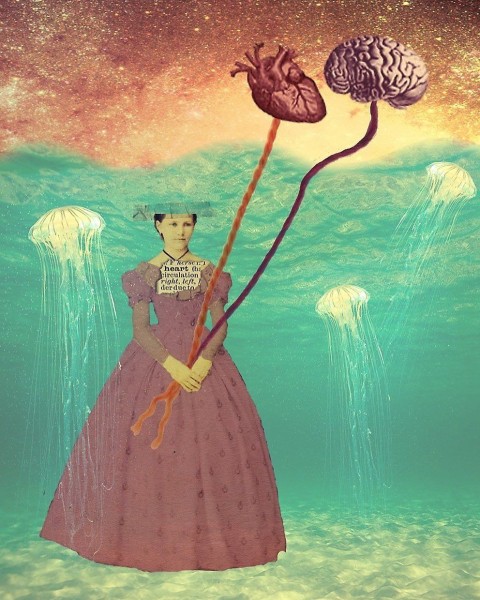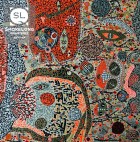When the doctor turns the ultrasound monitor towards you, you aren’t prepared for tentacles suctioned to the umbilical cord. You never imagined the large eye sockets, wide disks in the black and white, or the mesmerizing motion of a round body and fluid limbs.
We’ve never seen anything like this, he says. You’ll need to prepare.
Once home, you read everything you can find on Ocapa Squid. You talk with your husband about the new pink of their skin, how the tips of their arms are illuminated in the ocean depths. You think how lucky you must be, to be carrying something capable of that kind of magic.
You buy a tank and an all-in-one saltwater kit. You learn the parameters of nitrate and calcium. You learn how to check alkalinity. You fill the tank with plants and caverns, secret spaces for eight arms to curl into spiraled safety under a dim light. When you rest your hand on the protruding mounds above your navel, you imagine how it will feel to hold the bulbous head in the bend of your arm, to be embraced by soft limbs.
Your husband complains about the size of the tank. He asks if she should have her own room, away from the tv and reclining chair. If the chemicals and bags of multicolored rocks have to live by the kitchen door. But you know you’ll want her in the center of your small house. You’ll want to make sure she thoroughly consumes the gifts of feeder fish and roams confidently from the castle tower you placed in the back corner to the groves of kelp you planted along both sides. Her growing arms push out from your abdomen whenever you walk by, seeming to reach for the clean, thick glass.
One week past your due date, your water breaks. The nurses and doctor are amazed at how the squid can collapse and bend through the tunnel of your body. How she instinctually conforms to your pelvis’s curve. You can feel the stretch and pull, but not the sharp stab of bone against bone. When they give you the arms and elongated head that gushed from your core, lay her on your chest as she feels for your chin and traces your upper lip, you cling to the rims below her eyes. You see your reflection in the large black pupils and wonder how a heart could ever hold this much.
Your husband helps you transfer the squid from a portable tank to the one in your home. You both sit with faces pressed to the glass, reach in and grasp her searching arms, the long tentacles that trail in her wake. She knows the sound of your voice and moves when you call her yours. There’s no time for sleep when water must be tested for chemical balance, the plants tended, and the tank cleaned of unwanted algae and debris. Some nights your husband begs you to come to bed, rests his hands at the fall of your breasts.
What can I do if the water fills you up, he asks.
What can I do if it doesn’t, you reply.
The squid grows longer and the tank must be replaced. Soon there are blow-up pools where the couch once was. A whirlpool in place of the tv stand. Barnacles begin to grow on exposed surfaces and you spend hours in the water with her curved beak against your hand. Every moment tangled in eight ways to hold is the answer to every question you’ve asked about the stars. How the finality of her skin is the way you remember to breathe. How you never want to miss her mantle rise.
Your husband reads books on the back porch and moves his clothes to the trunk of his car. He chases the neighbors’ hounds in the yard, enjoying the beat of firm ground against his feet. You watch him from the pond you installed by your bedroom window, the view of life beyond your saltwater bed. The squid presses against your legs and begs for the bag of fresh shrimp you hold in your hands. This is the way you teach her how to love.
When the squid’s growing body is too large to contain, you seal the front door with a concrete blend. You caulk the baseboards and check the exterior for cracks. You order trucks of water delivered to your house, pumped in with great metal tubes that snap and pop with the pressure’s build and release. You ask your husband to come inside with you, to hold your girl’s weight close to his cheek.
How can we be if you aren’t here to, you ask.
How can we be if you can’t let her go, he says.
You watch him walk away as you close the last window, remember the way he used to touch your hair.
When the water rises above the curtains, you realize something is wrong. Long after the trucks have gone, the water continues to rise. You can feel it lift you to the rafters of the exposed vaulted ceiling. You no longer see the bamboo floors you installed when you first called yourself mother.
The squid circles your body in the open water, grazing your legs and pushing against your back. You let her lean again into your chest, wrap your arms around her wide form. You can feel the water breach the expanse that holds the last gulps of air, forcing you down where you now must hold your breath.
She offers you bits of fish. The last shrimp caught in her tentacles. She is all light in the dark. Variated pink and neon green. You watch the squid somersault above where the kitchen used to be. How graceful her wide, dancing arms. How they propel her body freely in the open blue.

Notes from Guest Reader Jeff Landon
I chose ‘Mother’ because it’s funny, moving, vivid and unexpected. This felt like a dream that made you want to go back to sleep to stay in this world.


 The core workshop of SmokeLong Fitness is all in writing, so you can take part from anywhere at anytime. We are excited about creating a supportive, consistent and structured environment for flash writers to work on their craft in a community. We are thrilled and proud to say that our workshop participants have won, placed, or been listed in every major flash competition. Community works.
The core workshop of SmokeLong Fitness is all in writing, so you can take part from anywhere at anytime. We are excited about creating a supportive, consistent and structured environment for flash writers to work on their craft in a community. We are thrilled and proud to say that our workshop participants have won, placed, or been listed in every major flash competition. Community works.